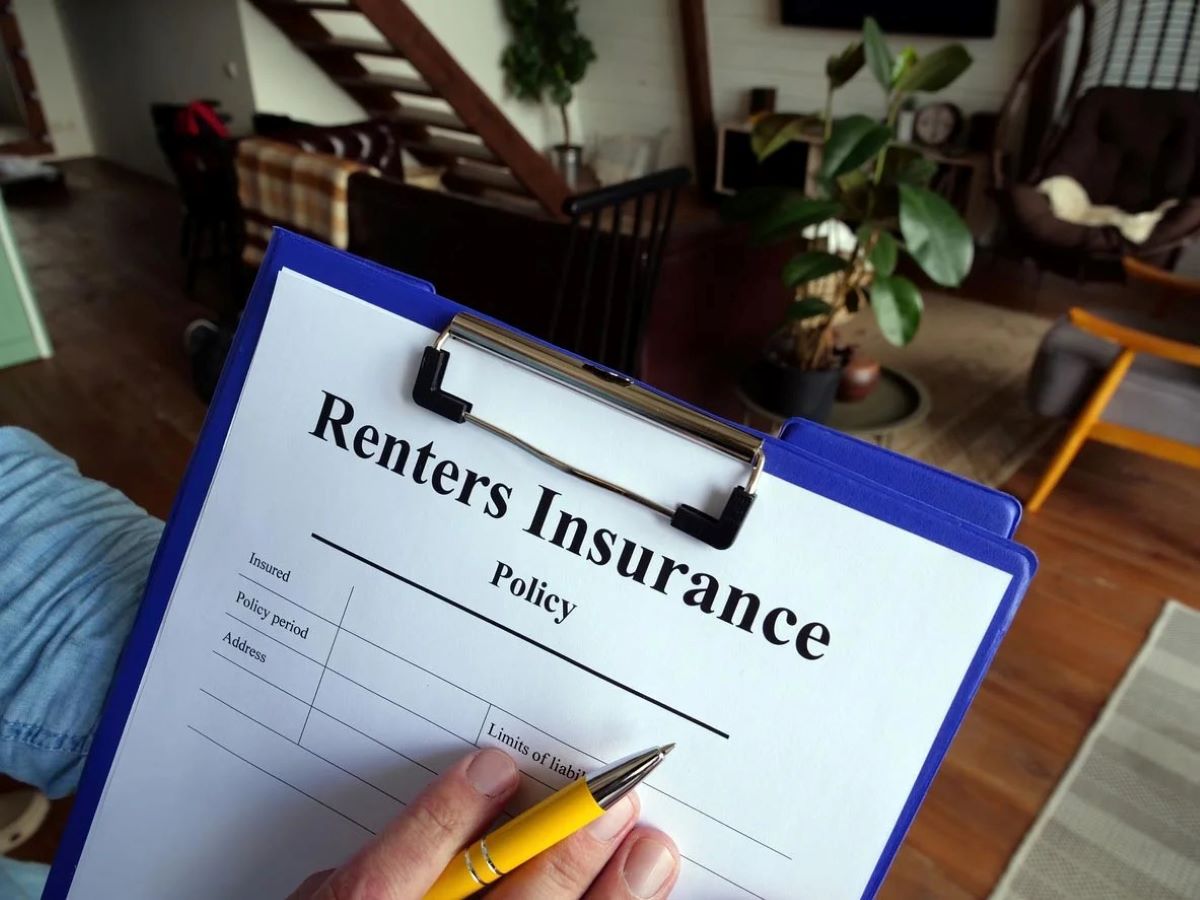

Finance
How To Get Renters Insurance Before Renting
Published: November 16, 2023
Looking to rent a new place? Learn how to easily obtain renters insurance to protect your finances and belongings.
(Many of the links in this article redirect to a specific reviewed product. Your purchase of these products through affiliate links helps to generate commission for LiveWell, at no extra cost. Learn more)
Table of Contents
- Introduction
- Understanding the Importance of Renters Insurance
- Researching Different Insurance Providers
- Comparing Coverage and Policy Options
- Obtaining Quotes and Cost Estimates
- Applying for Renters Insurance
- Providing Necessary Information and Documents
- Paying for Renters Insurance
- Reviewing and Understanding the Policy Terms
- Making Necessary Modifications or Additional Additions
- Finalizing and Activating the Renters Insurance Policy
- Frequently Asked Questions (FAQs)
- Conclusion
Introduction
Welcome to the world of renting! Whether you’re a first-time renter or an experienced tenant, finding a new place to call home is an exciting adventure. However, amidst the excitement of moving into a new space, it’s important not to overlook the need for renters insurance. Renters insurance provides essential protection for your personal belongings and liability coverage in case of accidents or damages.
In this article, we will guide you through the process of getting renters insurance before renting a property. We will cover everything from understanding the importance of renters insurance to finalizing and activating your policy. So, let’s jump right in and ensure that you are well-informed and adequately protected!
Before we delve into the details, it’s crucial to understand why renters insurance is a must-have for anyone living in a rented property. While your landlord’s insurance policy may cover the building structure, it won’t protect your personal possessions in the event of theft, fire, or other unforeseen circumstances. Without renters insurance, you could face significant financial losses if your belongings are damaged or stolen.
Moreover, renters insurance also offers liability coverage, which can be a lifesaver if someone is injured while visiting your rental unit or if you accidentally cause damage to the property. This coverage can help cover medical expenses or legal fees that may arise from such incidents.
Now that we understand the importance of renters insurance, let’s move on to the next step – researching different insurance providers. This is a crucial step in finding the right coverage that suits your needs and budget.
Understanding the Importance of Renters Insurance
Renters insurance offers vital protection and peace of mind for tenants. It acts as a safety net, safeguarding your personal belongings and providing liability coverage should an unfortunate event occur. Let’s explore some key reasons why renters insurance is essential:
Protection for Personal Belongings: Your personal belongings are valuable and hold sentimental significance. Renters insurance provides coverage for these possessions in case of theft, fire, water damage, or other covered perils. If a disaster strikes, having insurance can help you recover financially and replace your belongings.
Liability Coverage: Accidents happen, and if someone is injured while visiting your rental unit, you could be held legally responsible. Renters insurance includes liability coverage that can help cover medical expenses, legal fees, and property damage resulting from a covered incident. This coverage can protect your financial well-being in case of expensive lawsuits.
Temporary Living Expenses: If your rental unit becomes uninhabitable due to a covered event, such as a fire, your renters insurance policy may provide coverage for temporary accommodations, including hotel stays, meals, and other necessary expenses. This coverage ensures that you have a place to stay while your rental is being repaired or replaced.
Additional Living Expenses: In some cases, if you’re unable to live in your rental unit due to a covered event, renters insurance may cover additional living expenses beyond temporary accommodations. This can include the cost of renting a similar property, storage fees, or even transportation costs, depending on your policy’s terms and limits.
Piece of Mind: Renting a property involves certain risks, and having renters insurance provides a sense of security. Knowing that you have coverage in place can alleviate financial stress and allow you to focus on enjoying your rental experience without worrying about potential losses or liabilities.
While renters insurance is not typically required by law, many landlords now require tenants to have a policy in place before signing a lease. This requirement protects both the tenant and the landlord, as it ensures that tenants have coverage for their own belongings and liability, reducing any potential disputes or financial burdens.
Now that we understand why renters insurance is important, it’s time to move on to the next step – researching different insurance providers.
Researching Different Insurance Providers
When it comes to getting renters insurance, it’s crucial to choose a reputable insurance provider that offers comprehensive coverage and excellent customer service. Here are some key factors to consider when researching different insurance providers:
Financial Stability: Look for insurance companies with a strong financial reputation. This ensures that they have the financial resources to pay out claims promptly when needed. You can check the financial strength ratings of insurance companies through independent rating agencies, such as Standard & Poor’s or A.M. Best.
Coverage Options: Review the types of coverage each insurance provider offers. Standard renters insurance policies usually include coverage for personal belongings, liability protection, and additional living expenses. However, some providers may offer additional optional coverages, such as identity theft protection or pet liability coverage. Consider your specific needs and choose a provider who can accommodate them.
Pricing and Deductibles: Compare the prices and deductibles of different insurance providers. Premiums can vary based on several factors, including location, coverage limits, deductibles, and your personal circumstances. It’s essential to find a balance between affordability and the level of coverage you require. Be sure to inquire about any discounts that may be available, such as bundling policies or installing safety devices.
Customer Reviews: Take the time to read customer reviews and ratings for different insurance providers. This can give you insights into their reputation, the claims process, and overall customer satisfaction. Keep an eye out for any common issues or concerns mentioned by customers. Consider reaching out to friends, family, or colleagues for recommendations and firsthand experiences.
Customer Service: A reliable insurance provider should have excellent customer service. Check if they offer multiple ways to reach their representatives, such as phone, email, or live chat. Prompt and knowledgeable customer support can make a significant difference when filing a claim or seeking assistance.
Claim Handling: Research the claim handling process of different insurance providers. Find out how quickly claims are typically processed, what documentation is required, and how smoothly they handle the resolution of claims. Look for providers with a reputation for fair and efficient claims settlement.
Insurance Agents: Consider whether you prefer to work directly with an insurance agent or through an online platform. Insurance agents can provide personalized guidance and help you understand the policy details, while online platforms offer convenience and easy access to quotes. Choose a method that aligns with your preferences and needs.
By thoroughly researching and comparing different insurance providers, you can make an informed decision that best suits your requirements and budget. Once you’ve narrowed down your options, it’s time to move on to the next step – comparing coverage and policy options.
Comparing Coverage and Policy Options
Now that you have researched different insurance providers, it’s time to compare the coverage and policy options they offer. This step is crucial to ensure that you select a renters insurance policy that aligns with your specific needs and provides adequate protection. Here are some key factors to consider when comparing coverage and policy options:
Personal Belongings Coverage: Review the coverage limits for personal belongings offered by each provider. This includes coverage for items such as furniture, electronics, clothing, appliances, and more. Make sure the coverage amount is sufficient to replace your belongings in case of damage or loss.
Liability Coverage: Consider the liability coverage limits provided by each insurance provider. Liability coverage protects you if someone gets injured in your rental unit or if you accidentally damage someone else’s property. Ensure that the coverage limit is adequate to protect your financial well-being in the event of a costly liability claim.
Additional Living Expenses Coverage: Check the coverage limits for additional living expenses (ALE) provided by each insurer. ALE coverage helps cover the costs of temporary accommodations, meals, and other necessary expenses if you’re unable to stay in your rental unit due to a covered event. Make sure the ALE coverage is sufficient to meet your needs in case of displacement.
Deductibles: Examine the deductible options offered by different insurance providers. The deductible is the out-of-pocket amount you’re responsible for paying before the insurance coverage kicks in. Compare deductibles and consider your ability to pay that amount in the event of a claim. Keep in mind that a higher deductible may result in lower premiums but could mean higher out-of-pocket expenses in the event of a claim.
Add-On Coverages: Some insurance providers offer additional optional coverages that you may find valuable. These can include identity theft protection, coverage for high-value items like jewelry or artwork, or earthquake or flood coverage. Evaluate these add-on options and determine if any are necessary based on your location or personal circumstances.
Policy Exclusions and Limitations: Carefully review the policy exclusions and limitations listed in the insurance policies. Each provider may have different restrictions on what is covered and what is not. Look for any specific exclusions that may be relevant to your situation, such as coverage for certain breeds of pets or unique circumstances related to your rental property.
Price vs. Value: While price is an essential consideration, don’t solely base your decision on the cheapest quote. Assess the overall value of the coverage you will receive for the price you pay. Consider the reputation of the insurance provider, the level of customer service, and the claims process in addition to the cost. It’s important to strike a balance between affordability and comprehensive coverage.
Policy Terms and Renewal: Read and understand the policy terms, including the length of coverage and the renewal process. Ensure that the policy aligns with your intended rental term and that the renewal process is straightforward and transparent. Some policies may offer discounts for long-term commitments or loyalty to the insurer, so consider these factors as well.
By carefully comparing the coverage and policy options provided by different insurance providers, you can select a renters insurance policy that meets your unique needs and provides peace of mind. Once you’ve identified the right policy, it’s time to move on to the next step – obtaining quotes and cost estimates.
Obtaining Quotes and Cost Estimates
Now that you have compared the coverage and policy options offered by different insurance providers, it’s time to obtain quotes and cost estimates. This step will help you understand the pricing and affordability of the renters insurance policies you are considering. Here’s how to go about obtaining quotes:
Contact Insurance Providers: Reach out to the insurance providers you are interested in and inquire about getting a renters insurance quote. Most providers offer multiple ways to obtain quotes, including online forms, phone calls, or speaking to an agent in person. Choose the method that is most convenient for you.
Provide the Necessary Information: Be prepared to provide certain details to the insurance providers when requesting a quote. This may include your name, address, type of rental unit, security features in place, and estimated value of your personal belongings. The more accurate and detailed information you provide, the more accurate the quote will be.
Determine the Coverage Limits: During the quote process, you will need to decide on the coverage limits for personal belongings, liability protection, and additional living expenses. Consider your needs and budget when determining the appropriate coverage limits. The insurance provider can guide you through this process if needed.
Consider Deductibles: As you receive quotes, compare the deductibles associated with each policy. Remember that the deductible is the amount you will have to pay out of pocket before the insurance coverage applies. Higher deductibles generally result in lower premiums, but make sure you choose a deductible that is affordable for you in case of a claim.
Ask About Available Discounts: Inquire about any discounts offered by the insurance providers. Many insurers provide discounts for various reasons, such as bundling renters insurance with other policies, having safety features in your rental unit, or maintaining a good credit score. Taking advantage of these discounts can help reduce your overall premium.
Review the Quote and Cost Breakdown: Once you receive the quotes, carefully review them and understand the cost breakdown. Take note of the premium amount for each policy and the coverage it includes. Consider any additional fees or charges mentioned in the quote. This will help you make an informed decision based on affordability and value.
Compare Quotes and Policies: Compare the quotes and policies side by side. Evaluate the coverage, deductibles, price, and any additional benefits or features offered by each insurance provider. Consider the reputation and customer service of the providers as well. Choose a policy that provides comprehensive coverage at a price that fits your budget.
Ask for Clarification: If you have any questions or need further clarification about the quotes or policy terms, don’t hesitate to ask the insurance providers. It’s important to have a clear understanding of what is included in the policy before making a final decision.
By obtaining quotes and cost estimates from different insurance providers, you can make an informed decision about which policy offers the best value for your money. Once you’ve assessed the quotes, you’ll be ready to move on to the next step – applying for renters insurance.
Applying for Renters Insurance
Now that you have compared quotes and decided on the renters insurance policy that meets your needs, it’s time to start the application process. Applying for renters insurance is straightforward, and here are the steps to follow:
Contact the Insurance Provider: Reach out to the insurance provider you have chosen to apply for renters insurance. You can contact them through their website, over the phone, or by visiting a local agent. Provide them with your intention to apply for renters insurance and any additional information they may require.
Provide Personal Information: Be prepared to provide personal information, such as your full name, address, contact details, and date of birth. The insurance provider needs this information to create your policy and ensure accurate documentation.
Share Property Details: Furnish details about the rental property, including the address, type of unit, and any security features or safety measures in place. This information helps the insurance provider assess the risk associated with the property.
Specify Coverage Options: Indicate the coverage options you have chosen during the comparison process. Let the insurance provider know the desired coverage limits for personal belongings, liability protection, and additional living expenses. This ensures that your policy aligns with your specific requirements.
Provide Information about Belongings: Depending on the insurance provider, you may need to provide a general estimate of the value of your personal belongings. This helps determine the appropriate coverage level for your possessions.
Answer Additional Questions: The insurance provider may ask additional questions to assess risk and tailor the policy to your needs. These questions may pertain to security systems, previous insurance claims, or other relevant details that impact the coverage and premium.
Review and Confirm: Carefully review the application details before submitting it. Make sure all the information provided is accurate and complete. Double-check the coverage options chosen and ensure they align with your desired policy.
Pay the Premium: In order to activate the policy, you will need to pay the premium amount. The insurance provider will provide you with the payment options and the due date. Prompt payment ensures that your coverage begins as soon as possible.
Receive Confirmation and Documents: Once the insurance provider has processed your application and received the premium payment, they will provide you with a confirmation of coverage. This confirmation may include policy documents, terms and conditions, and any other relevant information. Keep these documents in a safe place for future reference.
Review the Policy: Take the time to carefully review the policy documents and familiarize yourself with the coverage, exclusions, and limitations. Understand what is covered and what is not, as well as the claims process and any applicable deductibles.
By following these steps, you can apply for renters insurance smoothly and ensure that you have the necessary coverage in place before you move into your rented property. Once you have received the confirmation, take the time to review and understand the policy terms before finalizing the process.
Providing Necessary Information and Documents
When applying for renters insurance, it’s important to provide the necessary information and documents to ensure a smooth and accurate application process. The insurance provider will require specific details to assess your eligibility and create your policy. Here’s what you need to provide:
Personal Information: Provide your full name, date of birth, address, and contact details. This information is essential for identifying you as the policyholder and for communication purposes throughout the policy term.
Rental Property Details: Furnish details about the rental property, including the address, type of unit (apartment, house, condo, etc.), and any unique characteristics that may impact coverage. This helps the insurance provider assess risk and create a policy tailored to your specific rental situation.
Estimated Value of Belongings: Provide an estimate of the value of your personal belongings. Include furniture, electronics, appliances, clothing, jewelry, and any other items that you want to ensure are covered by the renters insurance policy. This estimate helps determine the appropriate coverage limit for your possessions.
Security Measures: If your rental unit has any security features in place, such as a burglar alarm, smoke detectors, or deadbolt locks, inform the insurance provider. These measures can help reduce the risk of theft or damage, potentially leading to a more favorable premium.
Claims History: Disclose any relevant claims history you may have, including previous renters insurance claims or other types of insurance claims. This information allows the insurance provider to assess your risk profile and provide accurate coverage.
Additional Documents: Depending on the insurance provider, you may be required to provide additional documentation or proof of certain elements. This could include a copy of your lease agreement, identification documents, or proof of ownership for high-value items. The insurer may request these documents to validate the information provided and ensure accurate coverage.
It’s essential to be honest and accurate when providing the necessary information and documents. Any discrepancies or omissions could impact the validity of your policy and the coverage provided. If you have any questions about the information or documentation required, reach out to the insurance provider for clarification.
By providing the necessary information and documents, you enable the insurance provider to create a policy that aligns with your needs and accurately reflects your coverage requirements. It also helps ensure a smooth and efficient application process, allowing you to obtain renters insurance with a clear understanding of the policy terms and conditions.
Paying for Renters Insurance
Once you have completed the application process and chosen a renters insurance policy, it’s time to pay for your coverage. Paying for renters insurance is a straightforward process, and there are several payment options available to suit your convenience. Here’s what you need to know:
Premium Payment: The amount you owe for your renters insurance policy is called the premium. The premium is typically paid on an annual basis, but some insurance providers may offer monthly or quarterly payment options as well. The premium amount is determined by factors such as the coverage limits, deductibles, and any additional coverage options you have selected.
Payment Methods: Insurance providers offer various payment methods to accommodate different preferences. You can pay your premium through electronic fund transfers (EFT), credit card payments, checks, or online payment portals. Choose the payment method that is most convenient for you.
Payment Due Date: The insurance provider will specify a due date for your premium payment. It’s important to adhere to this deadline to ensure uninterrupted coverage. Late payments can result in a lapse in coverage, leaving you vulnerable to potential losses if an incident occurs during that period.
Automatic Renewal: Many insurance providers offer automatic renewal of your renters insurance policy, which means that your coverage is automatically renewed for the following term without the need for manual intervention. If you choose this option, ensure that the insurance provider has your up-to-date payment information to avoid any interruption in coverage.
Grace Periods: In some cases, insurance providers may offer a grace period for premium payments. A grace period is a specific number of days after the payment due date, during which you can still make a payment without any penalty or coverage interruption. Be aware of the grace period and its terms, if applicable, to avoid any adverse consequences.
Keep Records: After making your premium payment, it’s essential to keep a record of the transaction. Retain copies of payment receipts, confirmation emails, or any other documents that serve as proof of payment. These records can be valuable in case of any discrepancies or issues with your policy in the future.
Policy Renewal: Renters insurance policies are typically valid for a specific term, often one year. Before the policy expiration date, the insurance provider will send you a renewal notice with information about renewing your coverage. Review the renewal terms, including any premium adjustments, coverage changes, or discounts, and decide whether to renew your policy or explore other options.
Paying for renters insurance ensures that you have the necessary coverage in place to protect your personal belongings and liability. It’s important to make timely premium payments and keep track of the payment records to maintain continuous coverage. By understanding the payment process and adhering to the payment terms, you can have peace of mind knowing that you’re financially protected while renting your home.
Reviewing and Understanding the Policy Terms
After obtaining renters insurance and completing the payment process, it is crucial to review and understand the policy terms thoroughly. This step ensures that you have a clear understanding of the coverage, exclusions, limitations, and other important aspects of your policy. Here’s what you should focus on when reviewing your renters insurance policy terms:
Coverage Details: Review the coverage details section of your policy. Understand what is covered, including personal belongings, liability protection, and additional living expenses. Take note of the coverage limits and any sub-limits that may apply to specific types of property or events.
Exclusions and Limitations: Familiarize yourself with the exclusions and limitations of the policy. These are situations or events that the insurance company will not provide coverage for. Common exclusions may include damages caused by earthquakes, floods, maintenance issues, or intentional acts. Understanding these exclusions will help you to fill any gaps in coverage if necessary.
Deductibles: Take note of the deductibles stated in your policy. Deductibles are the portion of a claim that you are responsible for paying out of pocket before the insurance coverage kicks in. Understand how much you need to pay in the event of a claim and how it can impact the overall claims process and settlement.
Claim Process: Familiarize yourself with the process for filing a claim. Understand what documentation or evidence may be required and how to report a claim to the insurance provider. Knowing the proper procedure to follow in the event of a loss or damage will help streamline the claims process and ensure a prompt resolution.
Policy Renewal: Take note of the policy renewal terms and conditions. Understand the timeframe within which you can renew the policy and any premium adjustments or coverage changes that may occur. Consider setting a reminder for the renewal date to prevent a lapse in coverage.
Additional Coverages: If you have added any additional optional coverages to your policy, review the details of those coverages. Understand the additional protection that you have opted for, such as identity theft coverage or coverage for high-value items, and any specific terms or conditions associated with these additions.
Conditions of Liability Coverage: Pay specific attention to the conditions and limitations of liability coverage. Understand the circumstances under which the insurance provider will cover you for personal injury or property damage caused to others, as well as any exclusions or exceptions.
Effective Dates and Termination: Review the effective dates of the policy to ensure you have continuous coverage for the desired period. Take note of any provisions related to policy termination, such as cancellation policies and any penalties or refund policies that may apply.
If you have any questions or areas of confusion, don’t hesitate to reach out to the insurance provider for clarification. They will be able to explain the policy terms in detail and address any concerns or queries you may have.
Understanding the policy terms and conditions of your renters insurance policy is essential to making informed decisions, ensuring proper coverage, and maximizing the benefits provided. By taking the time to review and comprehend the policy, you can have peace of mind knowing that you possess the knowledge required to navigate the claims process and protect your interests.
Making Necessary Modifications or Additional Additions
As a renter, your insurance needs may evolve over time. Fortunately, renters insurance policies can be modified or enhanced to better suit your changing circumstances. Whether you need to make adjustments or add extra coverage, here’s what you should consider:
Change in Coverage Limits: If you acquire new valuable items or your existing possessions increase in value, you may need to adjust the coverage limits of your renters insurance policy. Contact your insurance provider to discuss increasing the coverage to adequately protect your belongings.
Policy Add-Ons: Evaluate any additional coverage options your insurance provider offers. You may find it beneficial to add coverage for specific items, such as jewelry, artwork, or electronics, which may have limits under a standard policy. Alternatively, you might consider adding coverage for specific risks like earthquakes or floods if you live in an area prone to such events.
Identity Theft Protection: In an increasingly digital world, identity theft protection has become a critical consideration. If your policy does not already include it, inquire about adding this coverage to safeguard yourself against potential financial losses or damages resulting from identity theft.
Liability Coverage Adjustments: Review the liability coverage of your renters insurance policy. If you believe the current liability limit is insufficient to protect your assets in the event of a claim, you may want to increase the coverage amount. This can provide additional financial security and peace of mind.
Change in Rental Property: If you move to a new rental property, inform your insurance provider of the change in address. They may need to update your policy to ensure the accurate alignment of coverage and reflect the specific details of your new residence.
Multiple Policy Discounts: Consider bundling your renters insurance policy with other insurance policies, such as auto or life insurance, with the same provider. Many insurance companies offer discounts for combining policies, so explore these options to potentially save money while maintaining comprehensive coverage.
Review and Comparison: Periodically review your policy and compare it to other options in the market. As your circumstances change or if you find more competitive rates or better coverage elsewhere, proactively evaluate your options to ensure that you are getting the best possible coverage at a reasonable price.
When making modifications or additional additions to your renters insurance policy, consult with your insurance provider to understand the implications of the changes. They can guide you through the process, explain the impact on premiums, and help you ensure that your policy continues to align with your evolving needs.
Remember, making necessary modifications or adding extra coverage to your renters insurance policy allows you to maintain the appropriate level of protection for your belongings and liabilities. By regularly assessing your insurance needs, you can adapt your policy to reflect changes in your life and enhance your overall coverage.
Finalizing and Activating the Renters Insurance Policy
Once you have reviewed, understood, and made any necessary modifications to your renters insurance policy, it’s time to finalize and activate the policy. This step marks the completion of the process and ensures that you are officially covered. Here’s how to finalize and activate your renters insurance policy:
Review the Updated Policy: After making any modifications or additions to your policy, review the updated version to ensure that all changes have been accurately reflected. Verify that the coverage limits, deductibles, and any additional coverages or endorsements are correctly documented.
Understand Policy Termination: Take note of the termination policy outlined in your renters insurance policy. Understand the circumstances under which the policy can be terminated and the procedures to follow if you need to cancel or adjust the coverage in the future. This will help you navigate any potential changes or termination requests effectively.
Premium Confirmation: Ensure that you have received confirmation of the premium payment for the policy period. Double-check the amount paid and the payment dates to ensure they align with your records. Retain these payment records for future reference.
Activate Coverage: With the policy finalized and the premium paid, your renters insurance coverage is officially activated. This means that you are now protected against covered perils for your personal belongings and have liability coverage in case of accidents or damages.
Notify Your Landlord: It is a good practice to inform your landlord that you have obtained renters insurance. Provide them with a copy of the policy or any required documentation to ensure that they are aware of your coverage. This can help establish a harmonious relationship and ensure that both parties are aware of their respective responsibilities.
Keep Policy Documents Safe: Safely store all policy documents, including the finalized policy, receipts, endorsements, and any other related paperwork. Create digital copies and keep physical copies in a secure location. Having easy access to these documents will be crucial in the event of a claim or coverage inquiries.
Review and Update Annually: Set a reminder to review your renters insurance policy annually. Life circumstances change, and your insurance needs may evolve over time. By conducting an annual policy review, you can ensure that your coverage remains adequate and adjust it if necessary.
Finalizing and activating your renters insurance policy marks an important milestone in your renting journey. By following these steps, you can have peace of mind knowing that you are financially protected against unforeseen events and losses.
Remember, if you have any questions or concerns about your policy at any time, don’t hesitate to reach out to your insurance provider. They are there to assist you and provide the necessary support to ensure that your coverage is tailored to your specific needs.
Frequently Asked Questions (FAQs)
1. Is renters insurance mandatory?
No, renters insurance is not typically mandatory by law. However, many landlords now require tenants to have renters insurance as a condition of the lease. Even if it’s not required, it is highly recommended to protect your personal belongings and liability.
2. What does renters insurance cover?
Renters insurance typically covers personal belongings in case of theft, fire, or other covered perils. It also provides liability coverage in case someone is injured in your rental unit or if you accidentally cause damage to someone else’s property. Additional living expenses coverage may apply if your rented unit becomes uninhabitable.
3. Is my roommate covered under my renters insurance policy?
Each roommate will generally need their own renters insurance policy to obtain coverage for their personal belongings and liability. Policies typically cover the named insured, so it’s important for each person to have their own policy.
4. How much renters insurance coverage do I need?
The amount of coverage you need depends on the value of your personal belongings and your potential liability exposure. Take an inventory of your belongings and assess their value to determine the coverage limit that suits your needs. It’s advisable to choose coverage that is sufficient to replace all of your belongings if necessary.
5. What is a deductible?
A deductible is the amount you are responsible for paying out of pocket before your insurance coverage applies. For example, if you have a $500 deductible and file a claim for $2,000 in damages, you would pay the first $500, and your insurance would cover the remaining $1,500 (up to your coverage limits).
6. What is liability coverage?
Liability coverage protects you if someone is injured in your rental unit or if you accidentally damage someone else’s property. It can help cover medical expenses, legal fees, and property damage resulting from covered incidents. Liability coverage is an essential part of renters insurance.
7. Can I get renters insurance if I have a pet?
Yes, you can still obtain renters insurance if you have a pet. However, some insurance policies have breed restrictions or exclusions for certain types of pets. Be sure to disclose your pet to the insurance provider to ensure proper coverage.
8. How can I save on renters insurance?
You can potentially save on renters insurance by bundling it with other insurance policies, maintaining a good credit score, installing safety features in your rental unit, or opting for a higher deductible. It’s also a good idea to shop around and compare quotes from different insurance providers to find the best rate.
9. What should I do if I need to file a claim?
If you need to file a claim, contact your insurance provider as soon as possible. They will guide you through the claims process, which typically involves providing documentation of the loss or damage, such as photos or receipts. It’s important to follow the instructions provided by your insurance company and provide any requested information promptly.
10. What happens if I move to a new rental property?
If you move to a new rental property, you should inform your insurance provider about the change in address. They may need to update your policy to reflect the new rental property’s details. It’s important to keep your renters insurance policy up to date with accurate information to ensure continued coverage.
Remember, these FAQs provide general information, but it’s always best to consult with your insurance provider for specific details and advice regarding your renters insurance policy.
Conclusion
Obtaining renters insurance is a crucial step in protecting yourself and your belongings as a renter. It provides coverage for your personal belongings, liability protection, and additional living expenses in case of unforeseen events. By understanding the importance of renters insurance and taking the necessary steps to obtain the right coverage, you can have peace of mind knowing that you are financially protected.
Throughout this article, we have discussed the importance of renters insurance and provided a comprehensive guide on how to obtain it. From researching different insurance providers to comparing coverage options, obtaining quotes, and finalizing the policy, each step is crucial in ensuring that you secure the best coverage for your needs.
Remember, renters insurance is not a one-time purchase – it’s important to review and update your policy regularly. As your circumstances change, you may need to modify your coverage or add additional protection. It’s essential to stay informed, communicate with your insurance provider, and understand the terms and conditions of your policy.
While it may seem like an extra expense, renters insurance offers invaluable protection that can save you from significant financial losses in the event of theft, damage, or liability claims. It provides you with the security and peace of mind to fully enjoy your rented space without worrying about potential risks.
Take the time to research insurance providers, compare quotes, and fully understand the coverage options available to you. Make informed decisions about your coverage limits, deductibles, and additional coverages. And if you ever have any questions or concerns, reach out to your insurance provider for assistance.
By following the steps outlined in this guide and taking the necessary precautions, you can confidently navigate the process of obtaining renters insurance. Protect your belongings, mitigate liability risks, and ensure that you have the necessary coverage to safeguard your financial well-being.
Remember, accidents can happen at any time, so don’t wait until it’s too late. Invest in renters insurance today to protect yourself, your belongings, and your peace of mind.














